Developing Manager - Task 2: Assessing Managerial Skills and Potential
VerifiedAdded on 2023/04/10
|10
|576
|262
Report
AI Summary
This report, focusing on the development of a prospective manager, assesses management skills, emphasizing the understanding of organizational targets, effective communication, and employee management. It analyzes personal strengths such as the ability to motivate employees and manage tasks efficiently, while acknowledging weaknesses like potential lack of focus and over-reliance on subordinates. The report identifies opportunities for managers to develop leaders and threats such as whistleblowing and complaints from colleagues. It concludes by setting objectives focused on maintaining good employee relations, fostering communication with top management, and achieving organizational goals. The report includes a reference list of relevant academic sources.

THE DEVELOPING
MANAGER
MANAGER
Paraphrase This Document
Need a fresh take? Get an instant paraphrase of this document with our AI Paraphraser
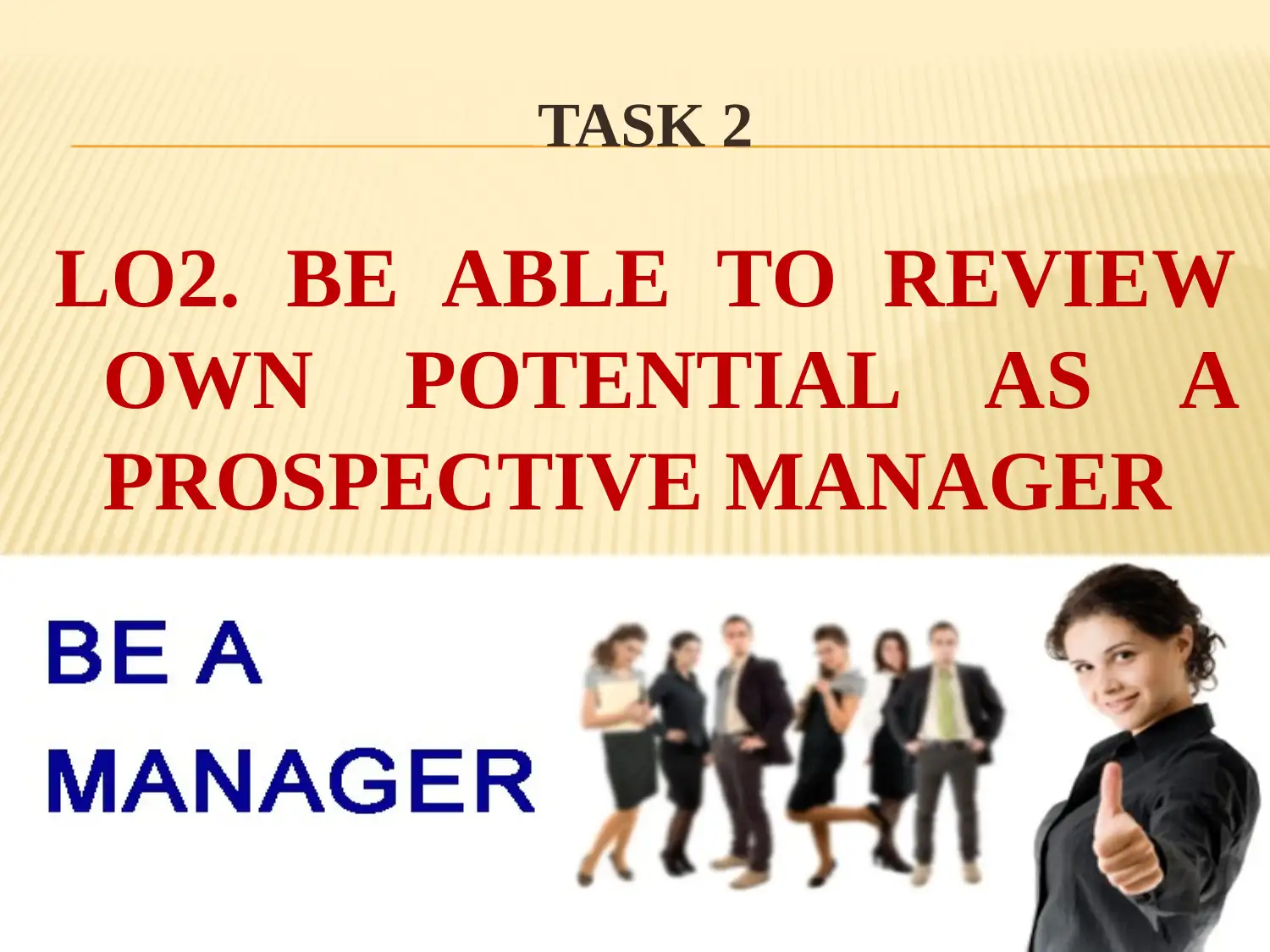
TASK 2
LO2. BE ABLE TO REVIEW
OWN POTENTIAL AS A
PROSPECTIVE MANAGER
LO2. BE ABLE TO REVIEW
OWN POTENTIAL AS A
PROSPECTIVE MANAGER
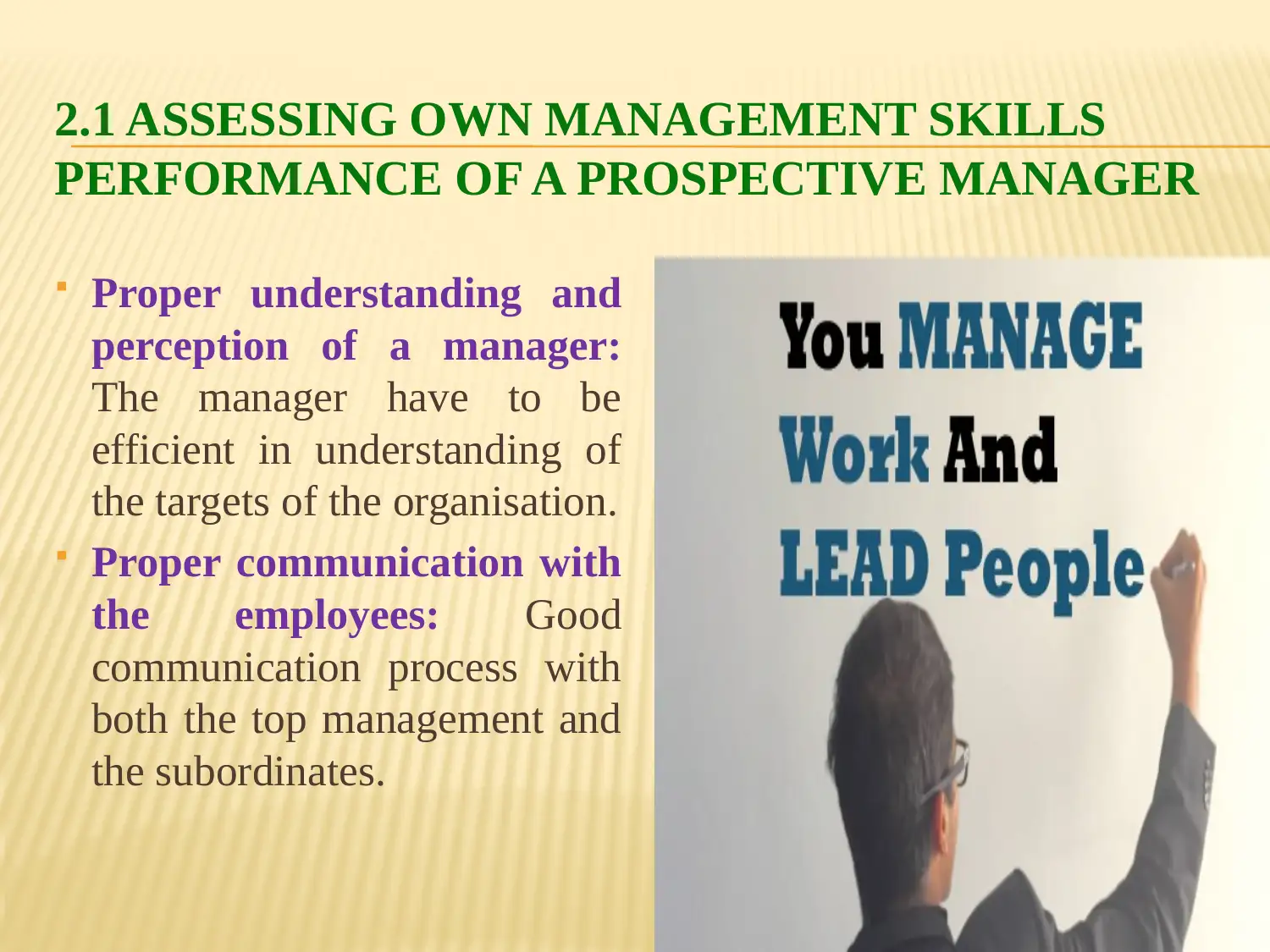
2.1 ASSESSING OWN MANAGEMENT SKILLS
PERFORMANCE OF A PROSPECTIVE MANAGER
Proper understanding and
perception of a manager:
The manager have to be
efficient in understanding of
the targets of the organisation.
Proper communication with
the employees: Good
communication process with
both the top management and
the subordinates.
PERFORMANCE OF A PROSPECTIVE MANAGER
Proper understanding and
perception of a manager:
The manager have to be
efficient in understanding of
the targets of the organisation.
Proper communication with
the employees: Good
communication process with
both the top management and
the subordinates.
⊘ This is a preview!⊘
Do you want full access?
Subscribe today to unlock all pages.

Trusted by 1+ million students worldwide
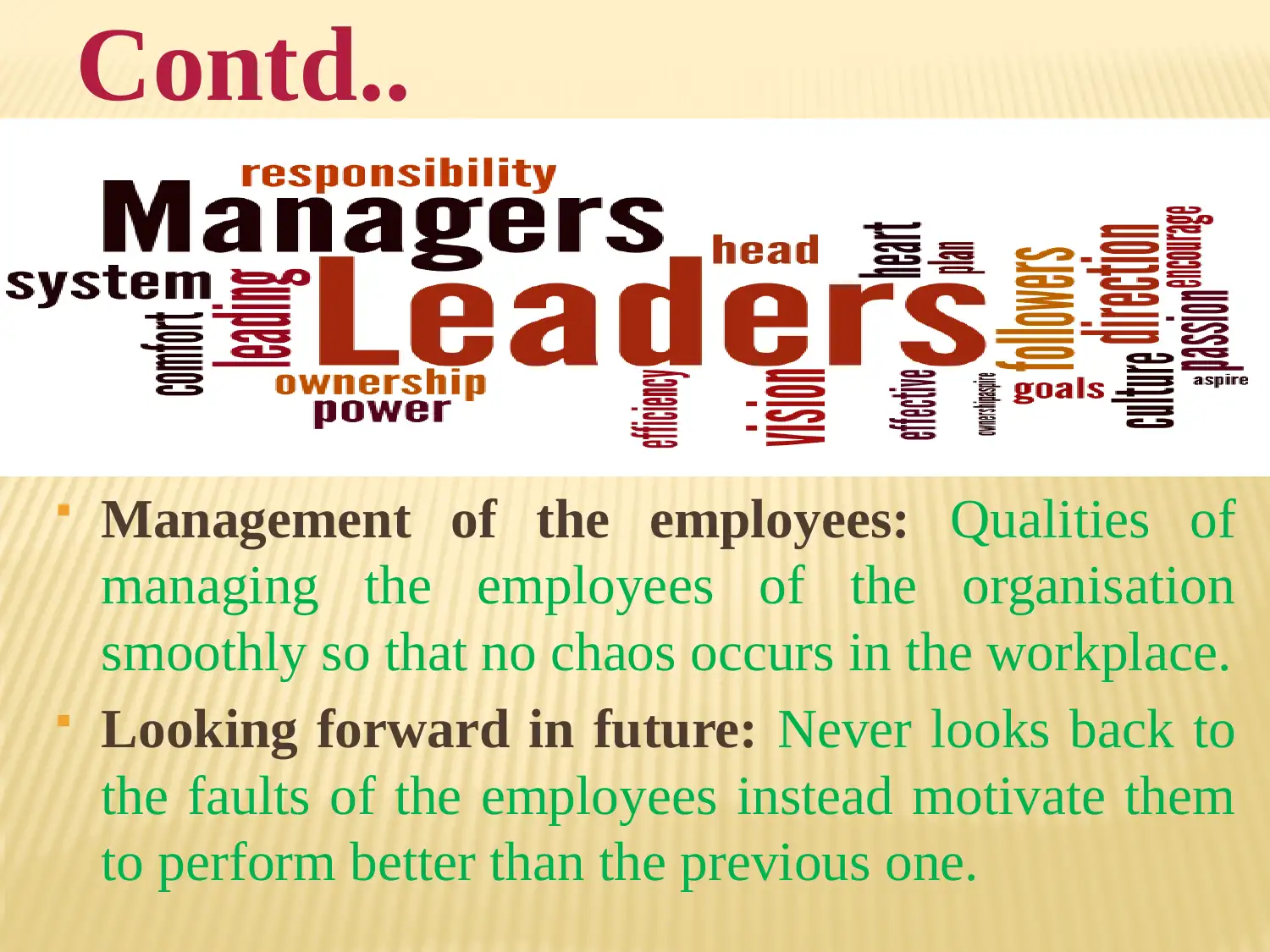
Contd..
Management of the employees: Qualities of
managing the employees of the organisation
smoothly so that no chaos occurs in the workplace.
Looking forward in future: Never looks back to
the faults of the employees instead motivate them
to perform better than the previous one.
Management of the employees: Qualities of
managing the employees of the organisation
smoothly so that no chaos occurs in the workplace.
Looking forward in future: Never looks back to
the faults of the employees instead motivate them
to perform better than the previous one.
Paraphrase This Document
Need a fresh take? Get an instant paraphrase of this document with our AI Paraphraser
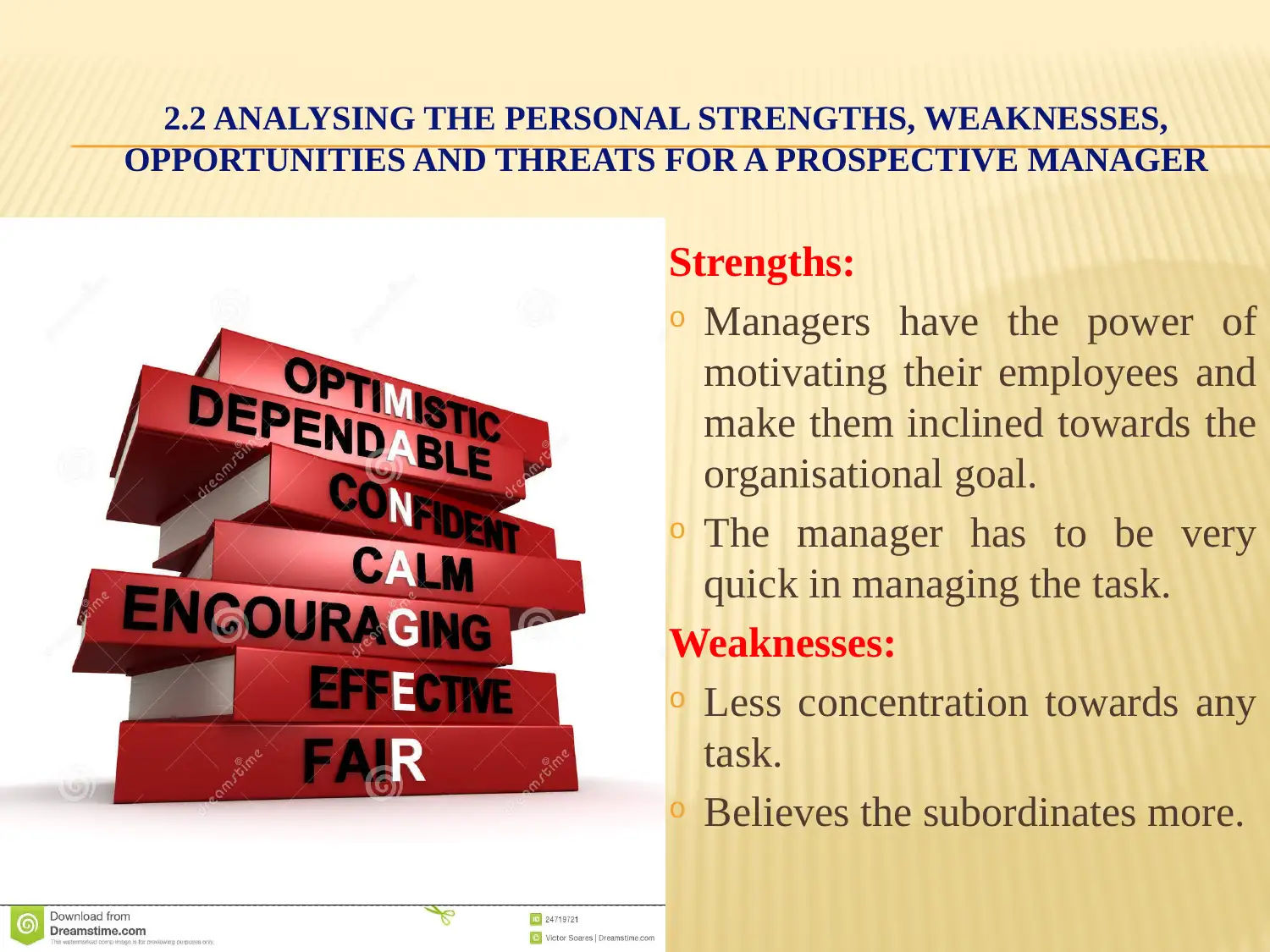
2.2 ANALYSING THE PERSONAL STRENGTHS, WEAKNESSES,
OPPORTUNITIES AND THREATS FOR A PROSPECTIVE MANAGER
Strengths:
o Managers have the power of
motivating their employees and
make them inclined towards the
organisational goal.
o The manager has to be very
quick in managing the task.
Weaknesses:
o Less concentration towards any
task.
o Believes the subordinates more.
OPPORTUNITIES AND THREATS FOR A PROSPECTIVE MANAGER
Strengths:
o Managers have the power of
motivating their employees and
make them inclined towards the
organisational goal.
o The manager has to be very
quick in managing the task.
Weaknesses:
o Less concentration towards any
task.
o Believes the subordinates more.
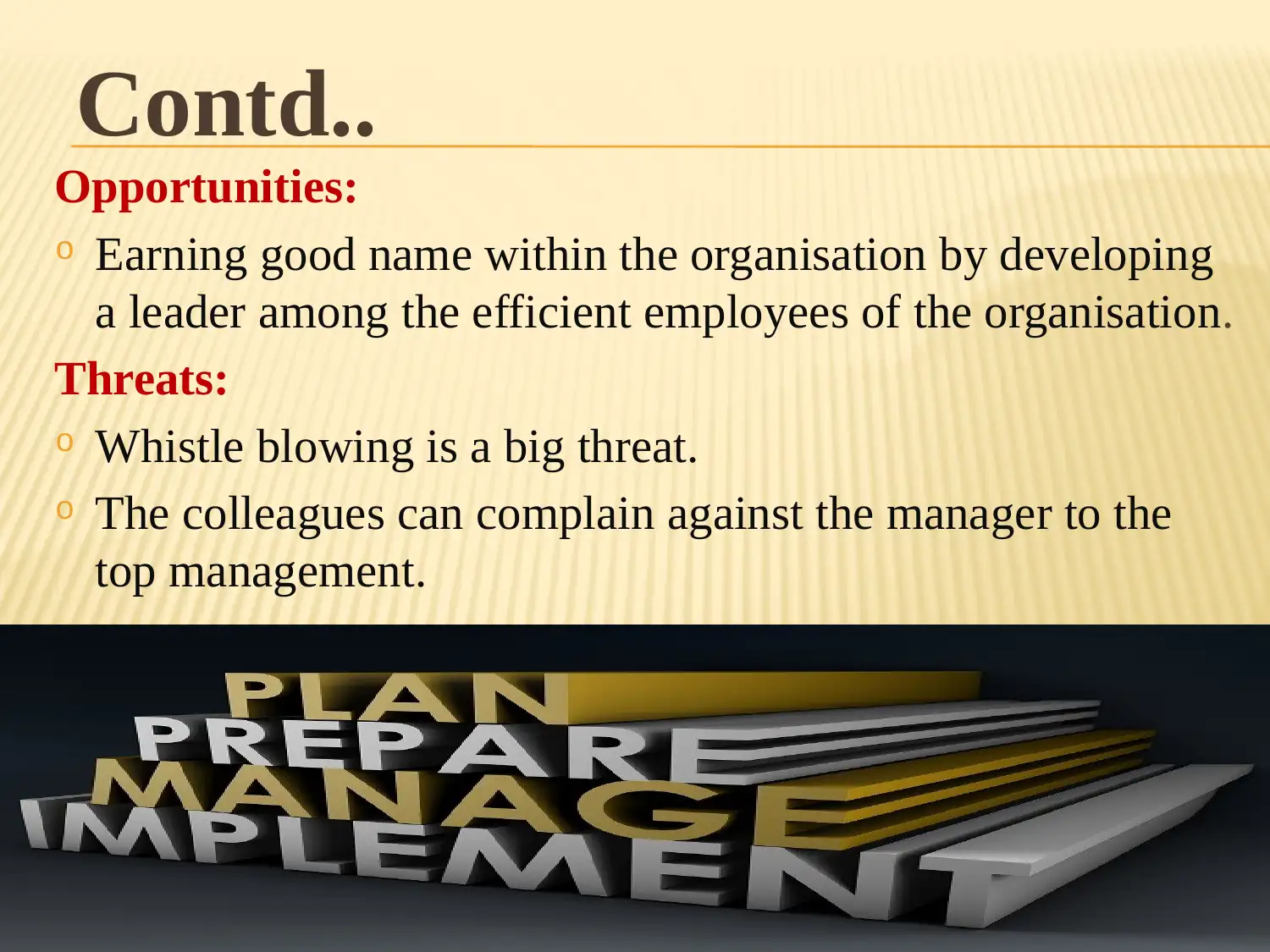
Contd..
Opportunities:
o Earning good name within the organisation by developing
a leader among the efficient employees of the organisation.
Threats:
o Whistle blowing is a big threat.
o The colleagues can complain against the manager to the
top management.
Opportunities:
o Earning good name within the organisation by developing
a leader among the efficient employees of the organisation.
Threats:
o Whistle blowing is a big threat.
o The colleagues can complain against the manager to the
top management.
⊘ This is a preview!⊘
Do you want full access?
Subscribe today to unlock all pages.

Trusted by 1+ million students worldwide
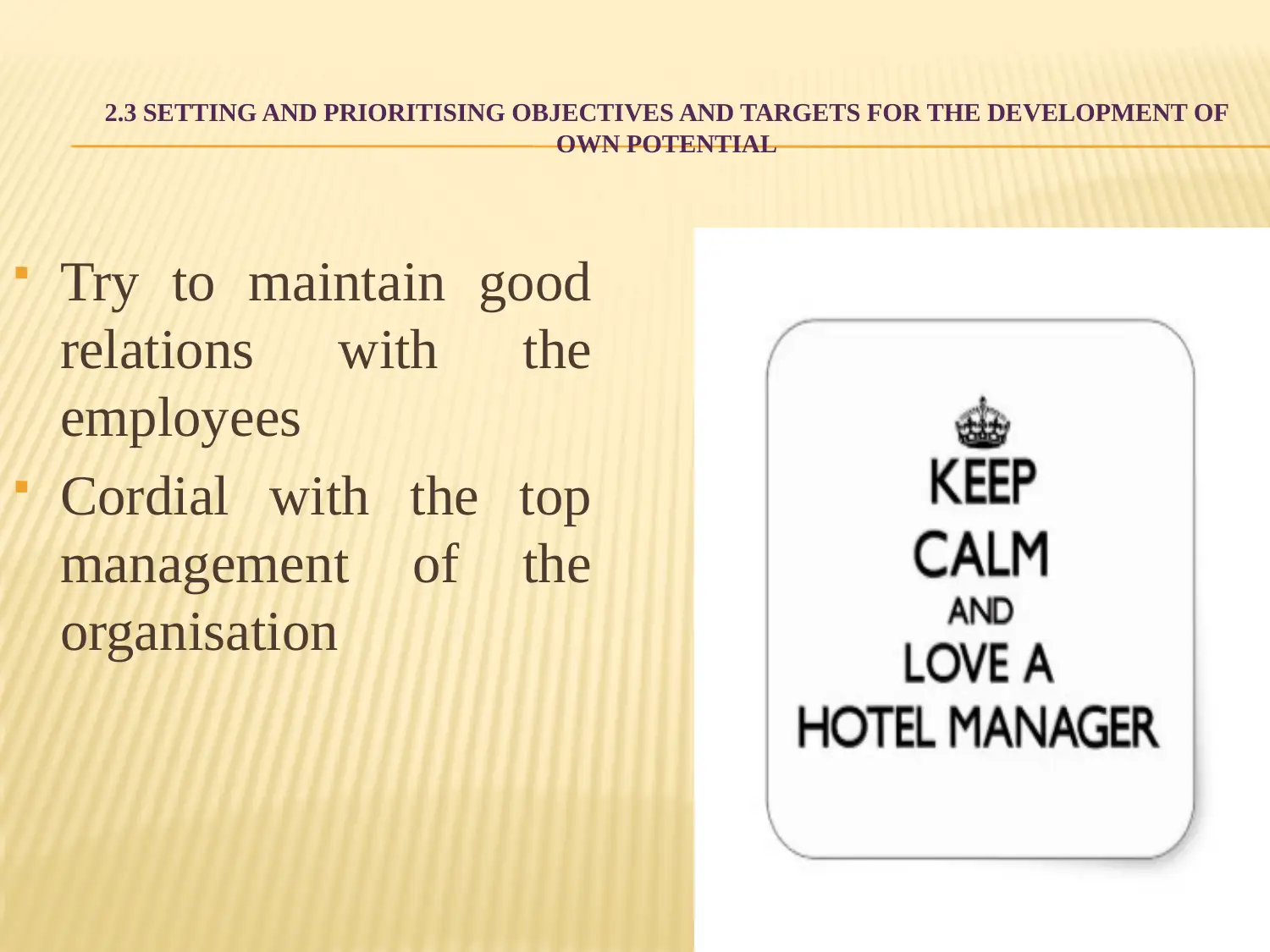
2.3 SETTING AND PRIORITISING OBJECTIVES AND TARGETS FOR THE DEVELOPMENT OF
OWN POTENTIAL
Try to maintain good
relations with the
employees
Cordial with the top
management of the
organisation
OWN POTENTIAL
Try to maintain good
relations with the
employees
Cordial with the top
management of the
organisation
Paraphrase This Document
Need a fresh take? Get an instant paraphrase of this document with our AI Paraphraser
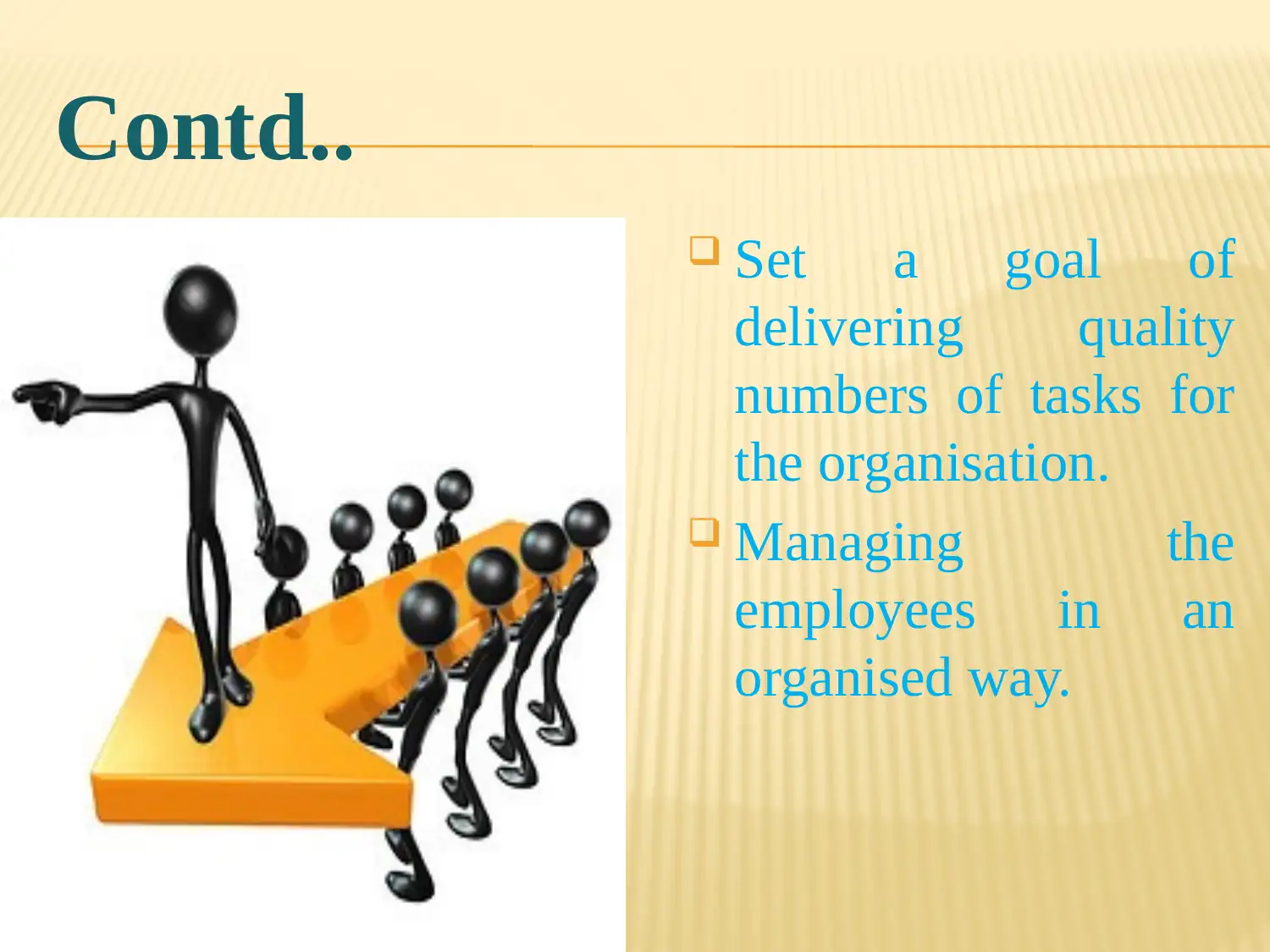
Contd..
Set a goal of
delivering quality
numbers of tasks for
the organisation.
Managing the
employees in an
organised way.
Set a goal of
delivering quality
numbers of tasks for
the organisation.
Managing the
employees in an
organised way.
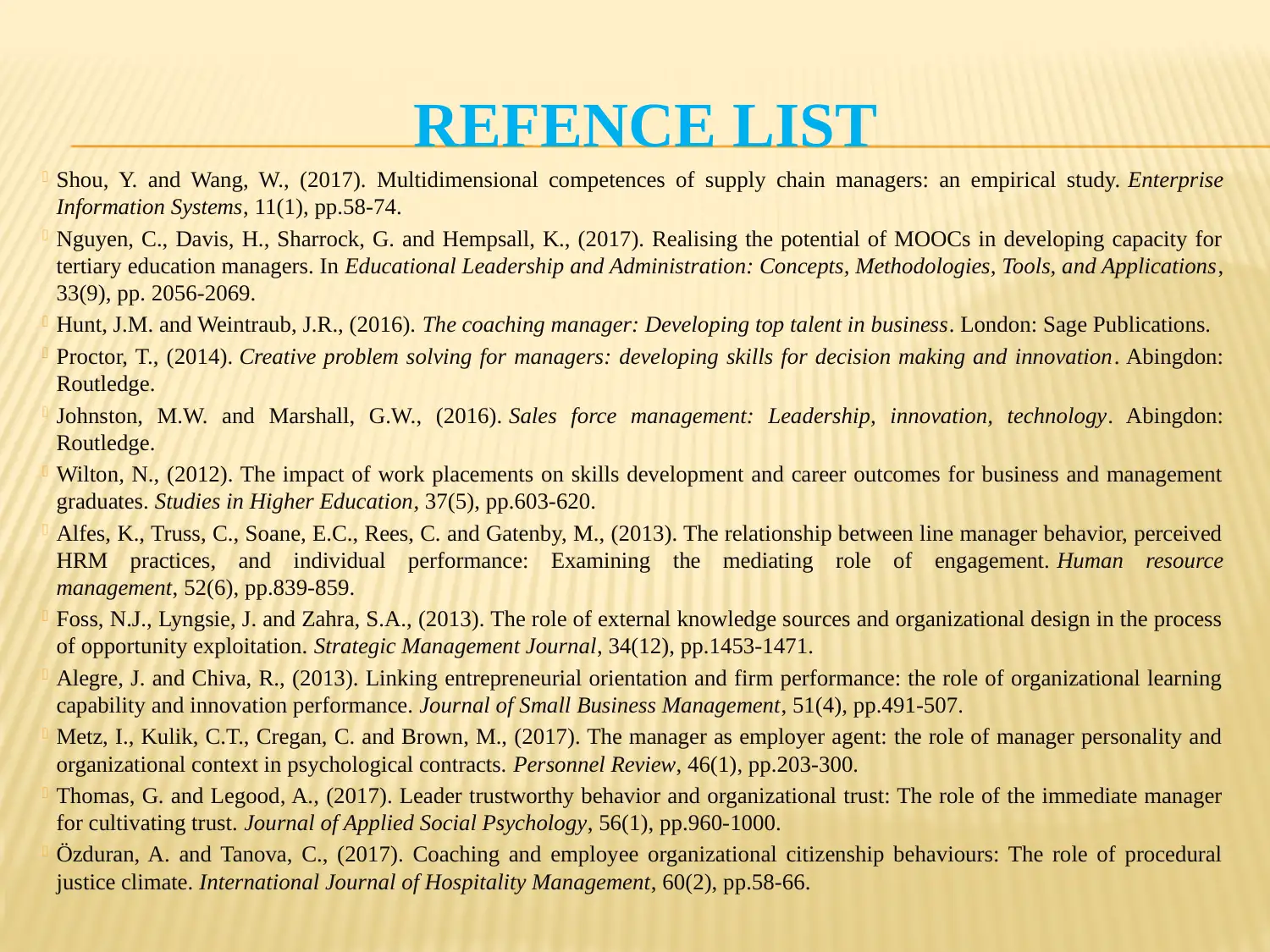
REFENCE LIST
Shou, Y. and Wang, W., (2017). Multidimensional competences of supply chain managers: an empirical study. Enterprise
Information Systems, 11(1), pp.58-74.
Nguyen, C., Davis, H., Sharrock, G. and Hempsall, K., (2017). Realising the potential of MOOCs in developing capacity for
tertiary education managers. In Educational Leadership and Administration: Concepts, Methodologies, Tools, and Applications,
33(9), pp. 2056-2069.
Hunt, J.M. and Weintraub, J.R., (2016). The coaching manager: Developing top talent in business. London: Sage Publications.
Proctor, T., (2014). Creative problem solving for managers: developing skills for decision making and innovation. Abingdon:
Routledge.
Johnston, M.W. and Marshall, G.W., (2016). Sales force management: Leadership, innovation, technology. Abingdon:
Routledge.
Wilton, N., (2012). The impact of work placements on skills development and career outcomes for business and management
graduates. Studies in Higher Education, 37(5), pp.603-620.
Alfes, K., Truss, C., Soane, E.C., Rees, C. and Gatenby, M., (2013). The relationship between line manager behavior, perceived
HRM practices, and individual performance: Examining the mediating role of engagement. Human resource
management, 52(6), pp.839-859.
Foss, N.J., Lyngsie, J. and Zahra, S.A., (2013). The role of external knowledge sources and organizational design in the process
of opportunity exploitation. Strategic Management Journal, 34(12), pp.1453-1471.
Alegre, J. and Chiva, R., (2013). Linking entrepreneurial orientation and firm performance: the role of organizational learning
capability and innovation performance. Journal of Small Business Management, 51(4), pp.491-507.
Metz, I., Kulik, C.T., Cregan, C. and Brown, M., (2017). The manager as employer agent: the role of manager personality and
organizational context in psychological contracts. Personnel Review, 46(1), pp.203-300.
Thomas, G. and Legood, A., (2017). Leader trustworthy behavior and organizational trust: The role of the immediate manager
for cultivating trust. Journal of Applied Social Psychology, 56(1), pp.960-1000.
Özduran, A. and Tanova, C., (2017). Coaching and employee organizational citizenship behaviours: The role of procedural
justice climate. International Journal of Hospitality Management, 60(2), pp.58-66.
Shou, Y. and Wang, W., (2017). Multidimensional competences of supply chain managers: an empirical study. Enterprise
Information Systems, 11(1), pp.58-74.
Nguyen, C., Davis, H., Sharrock, G. and Hempsall, K., (2017). Realising the potential of MOOCs in developing capacity for
tertiary education managers. In Educational Leadership and Administration: Concepts, Methodologies, Tools, and Applications,
33(9), pp. 2056-2069.
Hunt, J.M. and Weintraub, J.R., (2016). The coaching manager: Developing top talent in business. London: Sage Publications.
Proctor, T., (2014). Creative problem solving for managers: developing skills for decision making and innovation. Abingdon:
Routledge.
Johnston, M.W. and Marshall, G.W., (2016). Sales force management: Leadership, innovation, technology. Abingdon:
Routledge.
Wilton, N., (2012). The impact of work placements on skills development and career outcomes for business and management
graduates. Studies in Higher Education, 37(5), pp.603-620.
Alfes, K., Truss, C., Soane, E.C., Rees, C. and Gatenby, M., (2013). The relationship between line manager behavior, perceived
HRM practices, and individual performance: Examining the mediating role of engagement. Human resource
management, 52(6), pp.839-859.
Foss, N.J., Lyngsie, J. and Zahra, S.A., (2013). The role of external knowledge sources and organizational design in the process
of opportunity exploitation. Strategic Management Journal, 34(12), pp.1453-1471.
Alegre, J. and Chiva, R., (2013). Linking entrepreneurial orientation and firm performance: the role of organizational learning
capability and innovation performance. Journal of Small Business Management, 51(4), pp.491-507.
Metz, I., Kulik, C.T., Cregan, C. and Brown, M., (2017). The manager as employer agent: the role of manager personality and
organizational context in psychological contracts. Personnel Review, 46(1), pp.203-300.
Thomas, G. and Legood, A., (2017). Leader trustworthy behavior and organizational trust: The role of the immediate manager
for cultivating trust. Journal of Applied Social Psychology, 56(1), pp.960-1000.
Özduran, A. and Tanova, C., (2017). Coaching and employee organizational citizenship behaviours: The role of procedural
justice climate. International Journal of Hospitality Management, 60(2), pp.58-66.
⊘ This is a preview!⊘
Do you want full access?
Subscribe today to unlock all pages.

Trusted by 1+ million students worldwide

1 out of 10
Related Documents
Your All-in-One AI-Powered Toolkit for Academic Success.
+13062052269
info@desklib.com
Available 24*7 on WhatsApp / Email
![[object Object]](/_next/static/media/star-bottom.7253800d.svg)
Unlock your academic potential
Copyright © 2020–2026 A2Z Services. All Rights Reserved. Developed and managed by ZUCOL.





